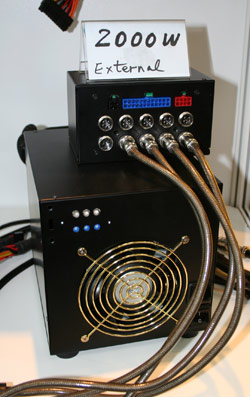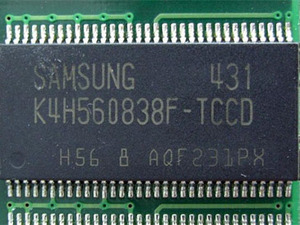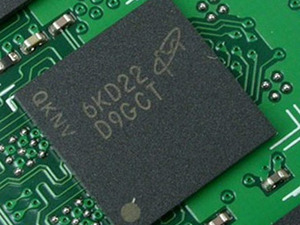CPUs
There’s much more to this than motherboards though, so let’s have a look at some of the other product segments that are affected by the industry shift. CPUs are a great example – long gone are the days where we spent countless hours seeking out certain processors with particular steppings: the Celeron 400a, AXIA/AVIA T-birds, 1.6a Northwood or Mobile Bartons. C’mon, that was fun.We're now blessed with the ability to pick up any Intel chip, whack it in virtually any inexpensive P35 motherboard and clock the nuts off it. Fantastic! For a £130 I have what makes up the backbone of a 3GHz dual-core system—that's what enthusiasts love to find; they’re looking for maximum value and solid performance.
My beef is that it wasn't until recently that Intel embraced the world of overclocking because it previously felt it was a menace to its frequency elevation sales model. For those who want a multiplier unlocked Intel processor, you have got to pay for an Extreme Edition. The question is though: how many of us can swallow £600-to-£900 for just a processor? At least AMD has recognised this fact with the launch of its ‘Black Edition’ processors but, after all, AMD was the one that introduced the overpriced flagship ‘enthusiast’ processors with the Athlon FX.
And in that respect it's a damn shame AMD's current Black Editions don't really go anywhere to build on its shining example. Thankfully though, we don’t need an unlocked CPU from Intel to reach great speeds – a classic example of this is Intel’s Core 2 Quad Q6600, which could replicate the performance of Intel’s then flagship QX6850 for a fraction of the price.
What really worries me is the apparent processor “split” for Nehalem based on the rumours going around at the moment. Of course, you have to take this with a grain of salt, but it doesn’t look promising to see the ‘enthusiast’ option with its different memory controller and no PCI-Express on chip will inevitably be more expensive than the other CPUs that have integrated graphics on-CPU. I worry that if the rumours are true, these specific CPUs will be a lot more expensive, and so will the motherboards and chipsets to accommodate this market niche – everyone milks their bit because the enthusiast pocket is deeper, right?
Driving a Greener future
 Again, while the "Green Drive" has been jumped on by almost everyone's marketing departments, it has actually turned out a few good products instead of just a new set of buzzwords. These include the PowerPlay technology from AMD, future Hybrid graphics solutions from both AMD and Nvidia, and the 80Plus program is turning out to be a successful common ground for all PSU manufacturers to look at attaining. As it is, our most recent reviews have shown some fantastic efficiency examples to reset the bar a little higher.
Again, while the "Green Drive" has been jumped on by almost everyone's marketing departments, it has actually turned out a few good products instead of just a new set of buzzwords. These include the PowerPlay technology from AMD, future Hybrid graphics solutions from both AMD and Nvidia, and the 80Plus program is turning out to be a successful common ground for all PSU manufacturers to look at attaining. As it is, our most recent reviews have shown some fantastic efficiency examples to reset the bar a little higher.However, the PSU realm has also gone into gross overzealousness in the past few years. It's extremely rare to need more than, say, 750W for a typical system—even if you’re running SLI or CrossFire—so why are there so many 1kW+ models on the market that no one needs? We've only ever had to need the use of a 1,500W once - not because we needed the full one thousand five hundred watts of power it had to offer, but because it was the only thing with six, 6-pin PCI-Express connectors for 3-way SLI – an extremely niche example in itself. Do we expect the power requirements to keep going up? And where do you go when you can't get any more efficient?
Sounds like what we’ve heard before
Sound Cards – we’ve reached 7.1 surround with Dolby, DTS and EAX-HD, now where? Can anyone really tell the difference between EAX 2.0, 3.0, 4.0 or 5.0 effects these days? Apart from soundcards finally moving to PCI-Express x1, I can’t see anyone anticipating an upgrade. When was the last time you ever read a thread asking when the next generation of soundcards will be released?In fact, many of us are keeping cards until complete redundancy – that doesn’t happen anywhere else in the industry. To further compound the problem for these companies, onboard sound has achieved such a level that it can indefinitely cater for most people’s needs and anyone with some enthusiasm for quality sound reproduction probably won’t use a PC anyway. There is still a difference in quality between onboard and discrete, but the general features are getting ever closer and it's harder to market “good quality” sound over a “gamer card that gives you more FPS!!1” because sound is a very subjective thing.
Stagnant Memories
What about Memory? Remember the days where we'd try to find BH-5s or TCCDs, and only certain modules used them. Finding a couple was a combination of careful detective work and keeping your ear to the ground. Unfortunately, these days, it doesn't matter who you buy your memory from because all the performance modules use Micron D9s – what you pay for these days is the warranty, the choice of heatsink and perhaps some extra speed binning for the most expensive modules.But for what that 50MHz is worth, it isn't, you’ll find it hard to notice a real world difference anyway and you’re better off investing in more memory instead – general productivity and many games will flourish with the extra leg room! We're blessed with rock bottom DDR2 prices at the moment, so it’s a great time to fill your system with as much memory as humanly possible.


For some, this advice won't matter – performance is performance, and dropping £200+ on 2GB of super-duper-eye-wateringly-fast DDR3 is still better than just £80 on 4GB DDR2. What we can’t forget about is the cumulative benefit of super high-end memory – in some cases it’ll allow you to achieve higher CPU or system overclocks. In other cases, it will contribute to an overall cumulative performance benefit, where a bunch of components offer a one or two percent performance advantage over a cheaper component and the result is a much bigger gain when all of the components are used together.

MSI MPG Velox 100R Chassis Review
October 14 2021 | 15:04









Want to comment? Please log in.